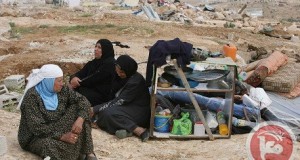09 May 2011 | Palestine News Network A group of Israeli settlers attacked on Monday morning a Palestinian school in the southern part of Nablus, northern West Bank. Witnesses told local media that the settlers smashed windows and put-up a ...
Read More »Israeli troops arrest four civilians during morning invasions targeting West Bank communities
09 May 2011 | Palestine News Network Four Palestinian civilians were arrested by Israeli soldiers, three from the same family, during morning invasions targeting West Bank communities. In Beit Sahour, a town in southern West Bank near Bethlehem, soldiers stormed ...
Read More »Bedouin hamlet destroyed for 3rd time
5 May 2011 | Maan News Women of the Bedouin herding hamlet of Khirbet Amniyr sat on the earth and watched Israeli forces demolish their 12 tent homes for the third time on Thursday morning. The women said they were ...
Read More »Palestinian women smuggled into Israel for 6th time
4 May 2011 | Palestinian Solidarity Project Earlier this week, a group of 12 Israeli women smuggled 8 Palestinian women and 4 children into Israel, in defiance of Israeli law. The trip was an act of civil disobedience intended to ...
Read More »Palestinian prisoners on hunger strike
4 May 2011 | PressTV Palestinian political prisoners in Israel’s Nafha jail have gone on a hunger strike to protest the inhumane treatment of detainees by the Israeli prison administration. Hundreds of Palestinian inmates held in the Israeli military detention ...
Read More »Settlers set fire to Huwwara prayer hall
3 May 2011 | Ma’an News Ultra-orthodox Jewish Israeli settlers raided the northern west Bank town of Huwwara in the early hours of Tuesday morning and according to residents set fire a prayer hall in the local school. Ghassan Daghlas, ...
Read More »Bassem Tamimi: “Our destiny is to resist”
2 May 2011 | Electronic Intifada When I met Bassem Tamimi at his home in the occupied West Bank village of Nabi Saleh this January, his eyes were bloodshot and sunken, signs of the innumerable sleepless nights he had spent ...
Read More »Visit to Awarta
29 April 2011 | Dr. Mazin Qumsiyeh We finally toured the devastated village of Awarta Wednesday and were stunned at what we saw and heard. On the way, we stopped by a tiny village called Izbet Al-tabib, a village of ...
Read More »RCF: State again reschedules testimony of Col. Pinky Zuaretz
26 April 2011 | Rachel Corrie Foundation In another round of last minute maneuvering, attorneys for the State in Corrie vs. State of Israel requested that testimony from their highest-ranking witness be postponed. Former Brigade Commander Colonel Pinhas (Pinky) Zuaretz, ...
Read More »Beit Ula names garden after slain Italian activist
25 April 2011 | Ma’an News Agency Hebron’s Youth Development Association re-named a small garden west of the city after murdered Italian activist Vittorio Arrigoni in a Sunday ceremony. Beit Ula Mayor Rateb Al-Omla presided over the event, thanking the ...
Read More » International Solidarity Movement Nonviolence. Justice. Freedom.
International Solidarity Movement Nonviolence. Justice. Freedom.
